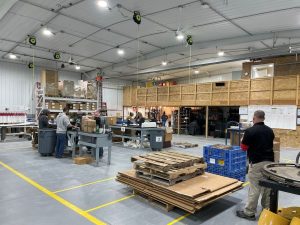Unemployment. It’s been part of our culture and has influenced our economy from the beginning. Whether you are an employer looking for good workers, or you are either unemployed or know someone who has been without work for a while, you know it affects more than just the bank account. It has an influence on physical, mental, and emotional health. The data abounds which shows that “those who are unemployed report feelings of depression, anxiety, low self-esteem, demoralization, worry, and physical pain. Unemployed individuals tend to suffer more from stress-related illnesses such as high blood pressure, stroke, heart attack, heart disease, and arthritis”. This is not new information.
We can go a step further. What about those struggling with barriers seemingly unrelated to work? In recovery from substance abuse? Anxiety? Dysfunctional relationships? A troubled past? Are in a cycle of poverty? The difficulty of being unemployed and working to navigate life is exponential. But there is hope!
There is a path to employment for even the toughest cases. But the journey to employment can be complicated. The issues faced are as varied as the people who are desperately looking for work. There must be a starting point. There is. And the starting point is learning what skills are needed to get back into the game.
In this article, we’ll focus on the basic skills needed to find and keep a job that you not only can do well, but love doing.
Importance of Technical Skill Training
In today’s job market on just about any level, technical skills, also referred to as hard skills, are extremely important. Whether it’s an office job, skilled labor, or a manufacturing job, understanding and having at least the basic skills to use computer software or run equipment is essential to finding a job. Rick Szymanski of Penn Commercial Technical School, says that one of the benefits of technical skill training is what he calls “enhanced employability. In today’s job market, possessing technical skills significantly enhances employability. . . technical skills can provide individuals with a competitive edge, opening up a broader range of job opportunities.”
While many employers are willing to train new employees on their processes and equipment, it’s a great advantage to be able to include on job applications or resumes any certifications, experience, or training. For those who are chronically unemployed or underemployed, or stunted by poverty, finding a way to learn these skills is not easy. Many times those impacted by both unemployment, toxic employment, lack of education, and any type of life-hindering barrier like substance addiction, it’s not only difficult but for some, nearly impossible to get the training they need. The information below plus a few tips should help!
Here are the most important technical skills to know.
Computer Skills
- Basic PC or Mac (Apple Computer) knowledge. Can you use Gmail? What about Microsoft Outlook? Most offices use one of these two programs so learn how to use them. Tips: Look on YouTube for basic training on these types of software. These are often free and can add to your skill set. If you are able, there are also a plethora of low-cost training programs that can even provide a certification you can include on your resume.
- Many local libraries have computer science classes for free. They also have computers which can be used by library card holders. If your local library does not have anything, check out a larger town nearby.
- Check out your local community college and see if there are any scholarships for low income or underserved people of any age. You may not be after a degree program but many times college will offer some type of job training certification which would be a great addition to your resume. If you live in Iowa, Des Moines Area Community College offers a Workforce Training Program which could be right for you. DMACC has so many extension offices around the state, you may be able to receive training in your own area.
Manufacturing Skills
- Search for nonprofits or church ministries who may provide some skill training. You can Google things like “manufacturing skill training near me” or “how can I learn manufacturing skills for free” and you’ll probably find something that might work for you. Here at The Well, we offer an extensive program called Well Works (learn more here) which partners with local businesses to provide job training that makes sense for those who are underserved. We serve both Pella, Knoxville, and Fairfield, Iowa and their surrounding communities.
- Call your local manufacturing companies and ask if they have any type of skill training they offer to the community.
- As shared above, check out community colleges nearby like DMACC in Iowa. Consider inquiring about their manufacturing training program. See if they offer scholarships and find out what the eligibility requirements are and see if you might qualify.
- Learn the language of manufacturing and production. You can Google things like “Manufacturing Terms” or “Manufacturing Production Vocabulary”. Here at The Well, program participants are immersed in a manufacturing mindset, learning about one-piece flow and continuous improvement. They will be better equipped than most first-time candidates applying for a job because of their familiarity with how a production environment works.

Well Works Pella workshop
Having the technical skills that employers really need is a great first step in doing everything within your power to find a good, long-term job.
Importance of Soft Skill Training
Even with the technical skills that you need, there are other skills which are even more important. The job industry calls these soft skills and if you want to land a job, and keep it, you need to know not only what they are, but find a way to learn them well. Employers in today’s labor market express the most frustration about some employees’ lack of soft skills, often leading to being let go. And then the cycle of unemployment and instability continues.
Within Well Works, we teach soft skills needed to thrive in the work environment. These are just some of the competencies that we focus on:
- responsibility
- accountability
- teamwork
- building work stamina
- responding well to coaching
- giving positive input for process improvement
- communicating effectively
- resolving workplace conflict in positive ways
If you’ve struggled with any of these specific skills while on the job, find a program which includes training in these areas. If you live in our area, consider reaching out to us. We’d love to share more about what we do. If you are an employer and you are looking to hire more people with these types of skills, let us know and we’ll see what we can do to help.
Importance of Recovery Skills, Life Skills, and Spiritual Health
Most work training programs tend to leave out recovery and spiritual health. If they are faith-based, you may be able to find help with these areas. Especially for those unemployed who struggle with the cycle of addiction, poverty, dysfunctional relationships, and/or mental illness, finding stability in all areas of their lives is what may bring their training to completion. For most people who struggle with navigating the chaos of life, the training may seem unending. Making small steps of progress towards a stable life, however, can be counted as success.
At The Well, we look at each person as an individual. Since we are a Christ-centered organization, spiritual health matters to us. For example, we don’t just leave our Well Works program participants with technical or soft skills they can’t actually use without addressing other underlying issues like debilitating depression, anxiety, and past traumas. We meet them where they are and through the love of Jesus, walk with them through recovery and eventually, success and wellness, physically, emotionally, and spiritually.
Each participant is engaged in programming that focuses on areas of instability. We create safe spaces to explore their relationship with God, their identity, value and worth. We dive into other areas that may be specific to the person, such as:
- Life Skills
- Emotional Health
- Spiritual Health
- Addiction/Recovery
- Healing
- Health & Wellness
You can learn more about what we do at The Well and Well Works at this link!

——————-
Being unemployed is a difficult place to find yourself. You are not alone! Most of us have been in your shoes at some point. In 2024, unemployment is at the core of the issues many people face with poverty, inadequate housing, mental illness, or substance abuse. Getting and keeping a job is a challenge. A downward spiral is possible, but if you are able to find the help and holistic training you need, not just the technical skills, you just might get, and keep, the job you’ve been hoping for.
1 Thessalonians 4:11-12 …make it your ambition to lead a quiet life: You should mind your own business and work with your hands, just as we told you, so that your daily life may win the respect of outsiders and so that you will not be dependent on anybody.
In the Bible, Luke 1:27, Jesus said to Mary when she questioned the angel that spoke to her about the coming Messiah, “nothing is impossible with God”. No matter how bleak the outlook is for you or someone you know, there is always hope in Jesus Christ.
Psalm 25:3 – All who hope in you will never be put to shame.
If The Well can help you along the road of unemployment, recovery, or any other life issues, we will. You can contact us here for more information on all of our programs and services. In Iowa, we serve Pella, Knoxville, Newton, and Fairfield.
If you are an employer who would like information on how we do what we do at Well Works, let us know. We’d love to share our story!